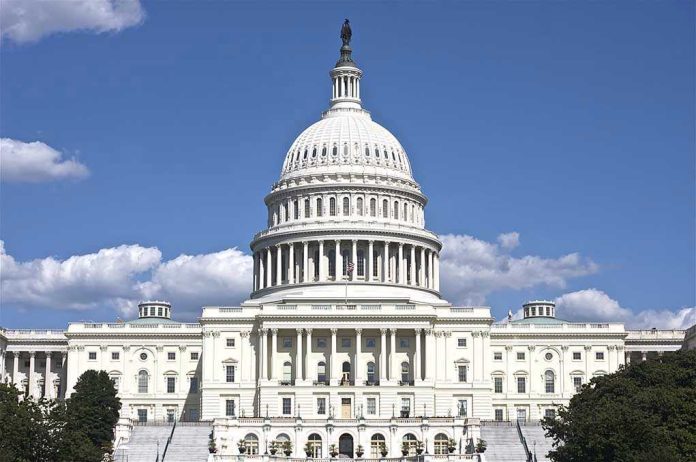
Political weaponization, media spin, and ambiguous threats—what actually happened when Hakeem Jeffries supposedly vowed to criminalize White House ballroom donors is far stranger, and far less clear, than any headline dares to admit.
Story Snapshot
- No credible evidence supports claims of Hakeem Jeffries vowing to criminalize White House ballroom donors.
- The narrative stems from ambiguous remarks, partisan commentary, and media amplification—not official policy or legal action.
- The controversy highlights the power of framing, language, and political distrust in America’s current climate.
- The real impact is increased partisan tension and a chilling effect on politically sensitive donations.
What Did Hakeem Jeffries Really Say—and Why Did It Spark Outrage?
House Minority Leader Hakeem Jeffries appeared on MSNBC and issued a warning to private donors funding President Trump’s proposed White House ballroom. He labeled the fundraising effort a “pay-to-play scheme” and cautioned that donors would face “future investigations” and “accountability.” The words hung in the air—vague, suggestive, and ripe for interpretation. Within hours, conservative media seized on the remarks, casting them as a threat to criminalize Trump’s supporters and as proof of Democrats wielding government power against political opponents.
No official record exists of Jeffries introducing legislation or launching a formal investigation against donors. The uproar, instead, was manufactured in the echo chamber of partisan commentary, where language is currency and ambiguity breeds outrage. The phrase “held accountable” was parsed, amplified, and transformed from political warning into evidence of an alleged new front in the war on dissenting citizens.
Tracing the Origins: Why a White House Ballroom Became a Political Lightning Rod
Trump’s plan to build a privately funded ballroom in the East Wing was, on its face, an effort to modernize facilities for state functions. Private individuals and organizations lined up to donate, some with business interests before the federal government. The optics were not lost on critics, who quickly drew parallels to “pay-to-play” allegations that have haunted both parties for decades. Yet, in the long tradition of White House renovations—from Theodore Roosevelt’s West Wing to Obama’s kitchen overhaul—never before had donors faced threats of criminal scrutiny simply for supporting a project.
Polarization guaranteed that any whiff of impropriety would draw fire. Prior incidents—like the Clintons’ departure with gifts and the perennial suspicion cast on presidential foundations—supplied a rich well of precedent for both parties to exploit. What was once routine fundraising became, overnight, a symbolic battle in America’s culture war.
Amplification and Outrage: How Media and Politics Turned Rhetoric Into a Scandal
Conservative outlets quickly reframed Jeffries’ ambiguous warning as an outright vow to “criminalize” donors. Opinion columns, talk shows, and viral tweets repeated the claim, often without context or verification. The language morphed from “possible investigations” to “criminal charges,” then to a sweeping narrative of government persecution. Meanwhile, Democratic leaders doubled down on calls for accountability, insisting their focus was rooting out corruption, not targeting private citizens. The actual facts—no formal investigation, no charges, no new laws—were lost amid the noise.
Behind the scenes, congressional committees and media personalities jockeyed for influence, knowing that the appearance of scandal is itself a potent weapon. For the donors, the risks became real: reputational harm, media scrutiny, and the possibility—however remote—of legal jeopardy simply for writing a check. For political operatives, the episode was a lesson in the power of framing and the volatility of today’s information ecosystem.
Fallout and Future: The Real Implications for Donors, Politics, and American Trust
Short-term fallout included partisan sniping, nervous donors, and another round of media frenzy. Long-term, the episode risks chilling private support for high-profile projects, especially those touching the third rail of presidential politics. The damage extends beyond individuals: trust in government, charitable giving, and even the non-profit sector all pay a price when ambiguity is weaponized and facts are optional.
Experts in American political history note that no credible precedent exists for criminalizing donations to White House renovations. The real danger, they argue, lies in how easily rhetoric becomes reality in a hyper-partisan environment. The story of the “criminalized donors” is not about legal action—it’s about the corrosion of trust, the power of amplification, and the perilous dance between fact and interpretation in American public life.
Sources:
PJ Media – Hakeem Jeffries Vows to Criminalize White House Ballroom Donors
PJ Media – Democratic Donors Sit on Sidelines as Party Schism Persists







